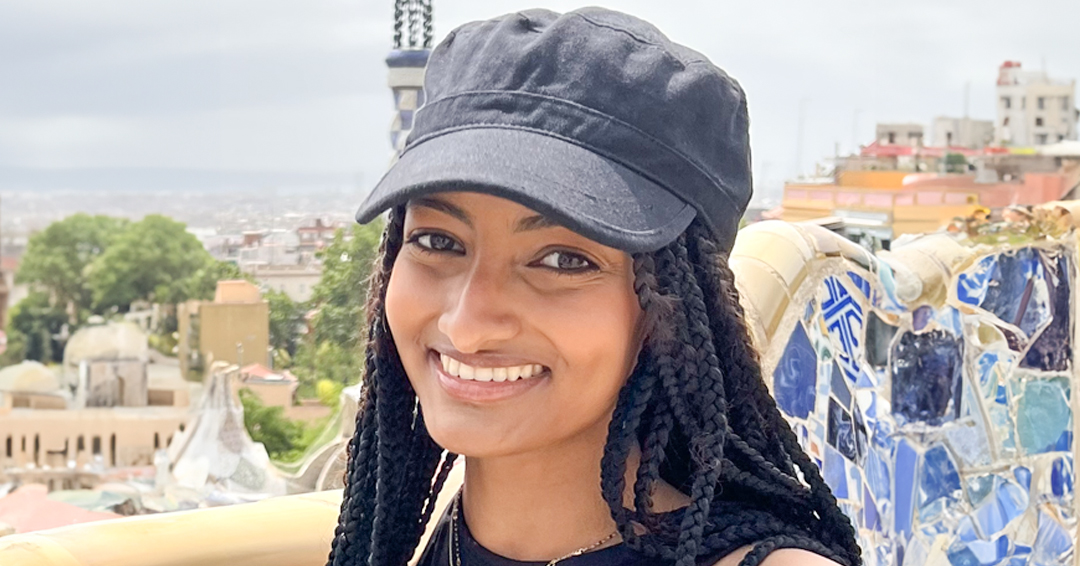
This Q&A series is part of Black History Month and Beyond, an initiative of the BHM Organizing Committee co-led by Black students and faculty from the Faculty of Medicine and Health Sciences with the Equity, Diversity, and Inclusion Anti-Racism Committee (EDI-AR) of the School of Population and Global Health.
- Can you tell us a bit about yourself?
I’m a second year MSc Public Health (MScPH) student in McGill’s Department of Epidemiology, Biostatistics and Occupational Health. I’m proudly Eritrean, though I was born in Toronto and raised in the GTA. I love art, playing the piano, and chatting about books! I’m super passionate about studying the social determinants of health in Canada, and would love to continue in that line of work.
- Can you describe your program of study and your research project?
I’m in a course-based master’s program here at McGill, and chose to join the epidemiology stream to solidify my knowledge of quantitative methods. For my practicum placement, I worked at Ottawa’s Bruyère Research Institute on several projects involving COVID-19 and long-term care. I’m also developing a manuscript presenting guidelines for the appropriate use and interpretation of race and ethnicity data in infectious disease and immunology research. I’ve had a wonderful experience working on these projects, and through my work, I’ve learned so much about the power of good research.
- What inspired you to pursue your area of research? What do you hope to achieve?
I was inspired to pursue an MScPH after taking an undergraduate course on the impact of plagues on human societies. This class was absolutely enlightening and solidified my interest in public health. In the future, I hope to continue conducting epidemiological research with a focus on the social determinants of health.
4. Why did you choose McGill?
McGill’s MScPH program is also known for its vigorous epidemiology and biostatistics training, which made it stand out compared to other public health programs. I’ve also lived in Ontario for my entire life and was very ready for a change. Finally, I hoped to improve my French, and Montréal seemed like the perfect place to practise!
5. Can you describe your community involvement and why do you feel it is important, especially as a member of the Black community?
During my undergraduate degree, I was an executive member of my school’s Black Students Association, through which I helped plan and coordinate fun events and workshops. More importantly, we strove to advocate for all Black students on campus, and ensure that they knew they had a strong community to rely on. I hoped to continue to serve the Black community once I arrived at McGill, and became involved in planning last year’s FMHS Black History Month events. These included a panel on community health without policing, and a film screening about racial health disparities. Currently, I’m working with a wonderful team of students to plan this year’s events.
6. How has your identity as a member of the Black community informed your research interests or community involvement?
My identity as a Black researcher has been critical in my work. It serves as a reminder that data isn’t impartial, and part of conducting good research is to constantly ensure that each step of the research process is developed critically and contextually. In terms of my own work, I’m very interested in social epidemiology and the social determinants of health, and I’m inspired every day by the work of Black researchers presently at McGill.
7. What advice would you give your younger self, knowing what you know today?
If I could advise my younger self, I would tell her to speak up more. Throughout life, there are countless moments where your voice holds the potential to make a significant impact, both for yourself and for the world around you.
Related:
BIPOC Change champions: Farida Zakariya, master’s student in Experimental Medicine
BIPOC Change Champions: In conversation with Thilor Ndiaye, PhD candidate in epidemiology
